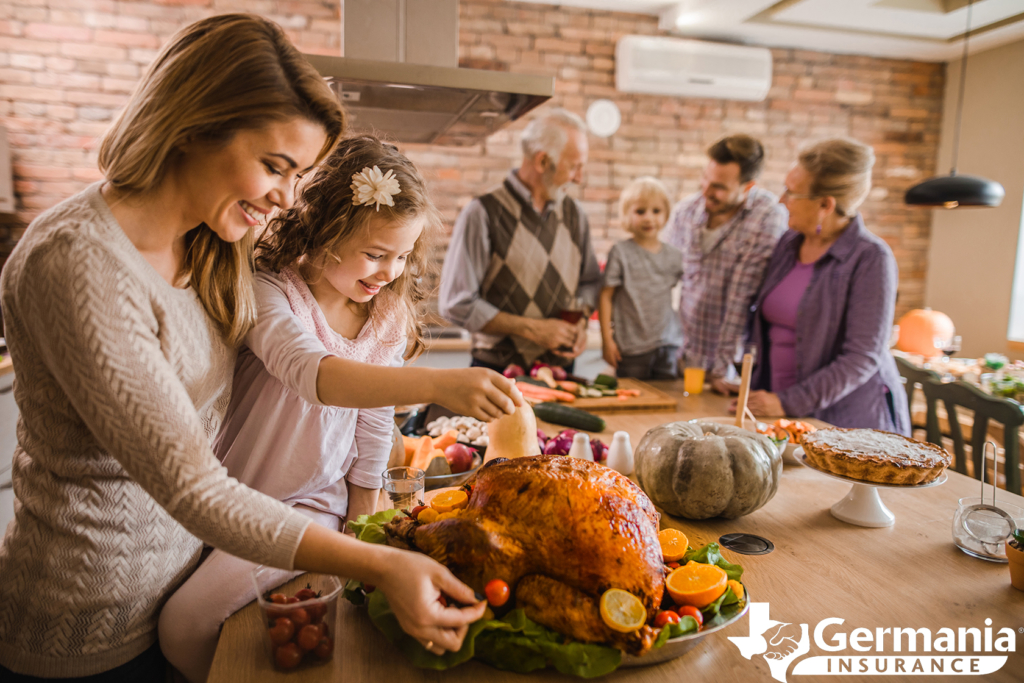Thanksgiving: a day of family, football, and a cornucopia of comfort foods. Next Thursday, tables will be adorned with steaming dishes of creamed corn, dinner rolls, green bean casserole, and, of course, turkey. While the typical Thanksgiving dinner only threatens a stuffed stomach, and perhaps a lengthy afternoon nap, cooking this holiday’s favorite fowl can be dangerous.
According to a report by the National Fire Incident Reporting System (NFIRS), the likelihood of a residential fire is double that of any other day of the year! In order to make sure your feast doesn’t go up in flames, read on and learn how to cook a Thanksgiving turkey safely!

Keep An Eye on the Bird
Most cooking fires are the result of an unattended stove. Whether you’re baking a turkey or steaming some veggies, stay in sight of the stove or oven as long as it’s on. Consider setting up a T.V. inside the kitchen so you don’t miss your favorite game!
Dress the Part
Just like operating heavy machinery, cooking with loose or baggy clothing can be a hazard. It only takes a moment for the sleeve of your sweater to catch fire when stirring the pot, so avoid such attire when you’re playing the part of the chef.
Assign Safe Tasks to Kids
Some kids love to be a part of the action in the kitchen, and Thanksgiving meal prep can be a great opportunity for them to pitch in. However, it can be dangerous to put them in charge of the heat. Instead, consider placing them in charge of measuring, pouring, and stirring. This allows them to be a part of the process and learn without putting them in harm’s way.
Check Your Fire Safety Gear
Make sure your smoke detectors and fire extinguishers are in working order. It is recommended that you check smoke alarms once a month and replace their batteries every six months. Fire extinguishers should have their pressure gauges checked once a month, but need to be annually certified by a professional every year.
Avoid Flammable Materials
While it’s important to have hot pads on hand (literally), these can lead to kitchen fires if left too close to hot surfaces. Your wooden spoon or spatula (the one that your mom used for decades) can also be a fire hazard, so make sure to place it on a rest away from the heat when you’re done using it.
Bake Your Bird
Frying a turkey might be delicious, but there is a reason that firefighters and insurance underwriters everywhere caution against it. In fact, Underwriters Laboratories has never given its seal of approval to a turkey fryer.
Unsurprisingly, a large vat of boiling grease greatly increases the probability of starting a fire because there are a number of things that can easily go wrong. Over-filling a fryer with oil can lead to a spill when the turkey is added. Partially-frozen turkeys can cause sputtering when introduced to hot oil, resulting in a fire. They can also simply tip over and spread flames instantly and grease fires are incredibly dangerous and difficult to extinguish (more on that soon).
If you do fry your turkey, always do so outdoors and keep the fryer on a level surface (that isn’t wood) away from buildings. Make sure not to over-fill the container and take into account the volume of the turkey so that it doesn’t overflow. If your setup doesn’t have a thermometer, get an attachable one so that you can monitor it properly and never leave the fryer unattended.
Grease Fires
Most grease fires can be prevented by using a thermometer, watching for smoke, and keeping a close eye on your cooking surface. No matter what, do NOT use water or a towel to try and put the fire out. Water can make a grease fire far worse, and flammable towels can easily catch and spread the flames.
Keep baking soda and a metal baking sheet nearby in case you need to cover an out of control fire. Baking soda has carbon dioxide in it, which can deprive the flame of oxygen, but only if the fire is relatively small. If it’s contained in a pot, turn off the stove and cover it with a lid or baking sheet if possible.
Fire extinguishers are usually the best option, but not all fire extinguishers are capable of putting out grease fires, so make sure you have the correct type.
It might seem like a good idea to try and get the burning dish outside, but moving it across the house can result in spillage, spreading the fire.
Oven fires
While baking times and temperatures vary based on the weight of the turkey, it’s always important to follow the baking instructions. However, even if you’re taking the safe route and baking your turkey in the oven, fires can still happen. If your oven or microwave catches fire, keep the door closed. Hopefully, this will deprive the flame of oxygen and extinguish it, but it’s always best to have your extinguisher at the ready.
When in Doubt, Get Out
Don’t risk playing the role of a firefighter. While putting out a small fire contained in a pot is possible, attempting to put out a blazing kitchen is extremely dangerous and should be left to the professionals. If you have the slightest doubt about your ability to put out the fire, get out and call the professionals at 9-1-1.
Have a safe and happy Thanksgiving!